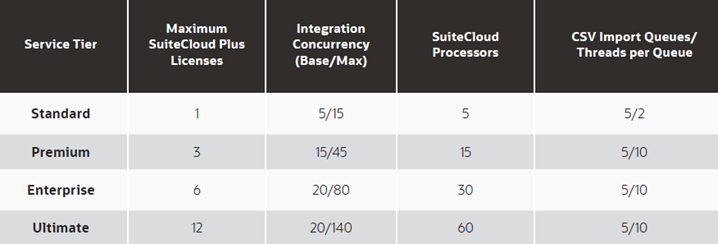This website uses cookies so that we can provide you with the best user experience possible. Cookie information is stored in your browser and performs functions such as recognising you when you return to our website and helping our team to understand which sections of the website you find most interesting and useful.
What Are NetSuite Service Tiers?

Oftentimes, NetSuite Users become aware of NetSuite’s Service Tiers at times when upgrading is required. Your Partners at Sikich want to make sure you have the information available to you beforehand, so you can be best prepared for when you may need to upgrade or scale your NetSuite Account to keep up with the current needs of your business.
NetSuite has 4 Service Tiers: Standard, Premium, Enterprise, and Ultimate.
Why would I need to upgrade my Tier?
There are 3 main reasons why you may be required to move from one NetSuite Service Tier to the next.
- One reason why it may be time for you to move to the next Service Tier, is if your company’s amount of NetSuite Licenses is exceeding the maximum quantity allowed for your Tier. If your business is continuing to grow in employee size, you will likely require additional NetSuite Licenses. The Standard Tier allows for up to 100 NetSuite User Licenses. The 100 User cap is inclusive of all Limited Access Licenses and General Access Licenses. Employee Center, Partner Center, Vendor Center, and Customer Center Licenses are not included in the user cap. NetSuite will inform NetSuite Users if the number of licenses on an account is pushing the maximum allowed for the Service Tier, but this is good to keep in mind as your company continues to expand. The Premium Tier allows for up to 1,000 NetSuite User Licenses, Enterprise, 2,000, and Ultimate, 4,000.
- Another reason why you may be required to move up to a new Service Tier is if the File Cabinet Storage being used is exceeding the maximum allowed for the current Service Tier. The Standard Tier allows for up to 100 GB of File Cabinet Storage. This storage relates to all files or data that are stored in the File Cabinet, which includes attachments, images, and templates. As your usage of File Cabinet Storage grows, you may find that the Premium Tier would be able to handle your storage needs better, as you are allowed up to 1,000 GB. From there, Enterprise allows for 2,000 GB, and Ultimate allows up to 4,000 GB. There are workarounds if you find yourself exceeding the amount of File Cabinet Storage allowed, and that includes the removal or transfer of this data through SuiteApps, such as Box.com, and custom scripts.
- The last reason why you may need to jump from your current Tier to the next is if you are exceeding the number of Monthly Transaction Lines allowed over a 6-month rolling average. Standard Tier has a maximum of 200,000 Monthly Transaction Lines, Premium, 2,000,000, Enterprise, 10,000,000, and Ultimate, 50,000,000.

Benefits of Upgrading your Service Tier
We have seen more and more users jump from Standard Tier to Premium Tier due to outgrowing one of the three areas listed above. Other than allowing for more users, more storage space, and more monthly transactions, upgrading to Premium Tier comes with many benefits that will allow your business to be better managed through NetSuite.
Below are some of those additional benefits you can expect to see with this upgrade:
- Reducing delays due to high volume bottlenecks
- Maintains user experience consistency
- Supports higher transaction throughput
- Room for additional concurrency processing
- Includes a sandbox
- Reduce integration delays
- Mitigate scheduled downtime
- More capacity for scheduled downtime

If you are wondering if you are close to hitting any of the 3 thresholds that would require a Tier Upgrade (User License Count, File Cabinet Storage, or Monthly Transaction Lines), or you have plans to scale your NetSuite to match your fast-growing business, please reach out to Sikich, as we would be happy to review your account and meet with you to discuss your options.
This publication contains general information only and Sikich is not, by means of this publication, rendering accounting, business, financial, investment, legal, tax, or any other professional advice or services. This publication is not a substitute for such professional advice or services, nor should you use it as a basis for any decision, action or omission that may affect you or your business. Before making any decision, taking any action or omitting an action that may affect you or your business, you should consult a qualified professional advisor. In addition, this publication may contain certain content generated by an artificial intelligence (AI) language model. You acknowledge that Sikich shall not be responsible for any loss sustained by you or any person who relies on this publication.




